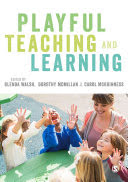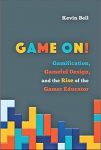Here are a few new books at the Education Library that can make your lessons more engaging and interesting.
 Burn Math Class by Jason Wilkes – Forget everything you’ve been taught about math. In Burn Math Class, Jason Wilkes takes the traditional approach to how we learn math–with its unwelcoming textbooks, unexplained rules, and authoritarian assertions-and sets it on fire. Focusing on how mathematics is created rather than on mathematical facts, Wilkes teaches the subject in a way that requires no memorization and no prior knowledge beyond addition and multiplication. From these simple foundations, Burn Math Class shows how mathematics can be (re)invented from scratch without preexisting textbooks and courses. We can discover math on our own through experimentation and failure, without appealing to any outside authority. When math is created free from arcane notations and pretentious jargon that hide the simplicity of mathematical concepts, it can be understood organically–and it becomes fun!
Burn Math Class by Jason Wilkes – Forget everything you’ve been taught about math. In Burn Math Class, Jason Wilkes takes the traditional approach to how we learn math–with its unwelcoming textbooks, unexplained rules, and authoritarian assertions-and sets it on fire. Focusing on how mathematics is created rather than on mathematical facts, Wilkes teaches the subject in a way that requires no memorization and no prior knowledge beyond addition and multiplication. From these simple foundations, Burn Math Class shows how mathematics can be (re)invented from scratch without preexisting textbooks and courses. We can discover math on our own through experimentation and failure, without appealing to any outside authority. When math is created free from arcane notations and pretentious jargon that hide the simplicity of mathematical concepts, it can be understood organically–and it becomes fun!
Following this unconventional approach, Burn Math Class leads the reader from the basics of elementary arithmetic to various “advanced” topics, such as time-dilation in special relativity, Taylor series, and calculus in infinite-dimensional spaces. Along the way, Wilkes argues that orthodox mathematics education has been teaching the subject backward: calculus belongs before many of its so-called prerequisites, and those prerequisites cannot be fully understood without calculus.
Like the smartest, craziest teacher you’ve ever had, Wilkes guides you on an adventure in mathematical creation that will radically change the way you think about math. Revealing the beauty and simplicity of this timeless subject, Burn Math Class turns everything that seems difficult about mathematics upside down and sideways until you understand just how easy math can be. [Google Books]
 Playful Teaching and Learning by Glenda Walsh, Dorothy McMillan and Carol McGuinness – Every early years practitioner should be able to captivate and maintain the interest of young children in their setting, through the provision of a playful learning experience.
Playful Teaching and Learning by Glenda Walsh, Dorothy McMillan and Carol McGuinness – Every early years practitioner should be able to captivate and maintain the interest of young children in their setting, through the provision of a playful learning experience.
Covering age ranges 3-8 years, this textbook explores the importance of infusing playfulness throughout the entire early years day, and includes chapters that:
establish the core principles underpinning playful teaching and learning
help students and practitioners understand how playfulness can be applied to all aspects of the early years curriculum including mathematics, literacy, outdoor environments, science & technology, and ICT
explore core issues in early years provision including observing, planning & assessment, and how they relate to playful learning
emphasize the role and qualities of the playful professional.
This is a fantastic resource for any student or practitioner looking to enrich the lives of young children through meaningful playful learning experiences. [Google Books]
 Game on!: Gamification, Gameful Design, and the Rise of the Gamer Educator by Kevin Bell – The changing student body in American higher education demands a new approach to teaching, one that moves toward inclusive, hyperpersonalized learning environments that have much in common with games and social media. Kevin Bell’s Game On! presents dynamic case studies of gamer educators and game-derived techniques to help instructors creatively formulate their own teaching strategies.
Game on!: Gamification, Gameful Design, and the Rise of the Gamer Educator by Kevin Bell – The changing student body in American higher education demands a new approach to teaching, one that moves toward inclusive, hyperpersonalized learning environments that have much in common with games and social media. Kevin Bell’s Game On! presents dynamic case studies of gamer educators and game-derived techniques to help instructors creatively formulate their own teaching strategies.
Breaking gamefully designed classes into their component parts, Bell analyzes what these classes are actually doing and explains why they work. He offers faculty a rubric to assess their own courses for their propensity to engage students, particularly those from low socioeconomic and high-risk populations. Bell explores how game design, pedagogy, and intrinsic motivators can level the playing field to produce rigorous learning environments that are as addictive to all participants as the latest apps and social media systems. He also discusses best practices, lays out the broader context of computer-mediated teaching and learning, and considers the challenges and opportunities that gamification presents.
Instructors would do well to consider the key tenets of successful games if they are to engage and graduate the coming generations of learners. Bell’s careful analysis of the theories behind gamification, cognitive science, and instructional design will help them to do just that. [Google Books]